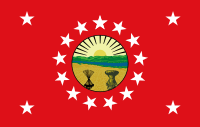Thomas Corwin
| Thomas Corwin | |
|---|---|
 | |
| 20th United States Secretary of the Treasury | |
|
In office July 23, 1850 – March 6, 1853 | |
| President | Millard Fillmore |
| Preceded by | William M. Meredith |
| Succeeded by | James Guthrie |
| United States Senator from Ohio | |
|
In office March 4, 1845 – July 20, 1850 | |
| Preceded by | Benjamin Tappan |
| Succeeded by | Thomas Ewing |
| 15th Governor of Ohio | |
|
In office December 16, 1840 – December 14, 1842 | |
| Preceded by | Wilson Shannon |
| Succeeded by | Wilson Shannon |
| Member of the U.S. House of Representatives from Ohio's 7th congressional district | |
|
In office March 4, 1859 – March 12, 1861 | |
| Preceded by | Aaron Harlan |
| Succeeded by | Richard A. Harrison |
| Member of the U.S. House of Representatives from Ohio's 4th congressional district | |
|
In office March 4, 1833 – May 30, 1840 | |
| Preceded by | Joseph Vance |
| Succeeded by | Jeremiah Morrow |
| Member of the U.S. House of Representatives from Ohio's 2nd congressional district | |
|
In office March 4, 1831 – March 3, 1833 | |
| Preceded by | James Shields |
| Succeeded by | Taylor Webster |
| Personal details | |
| Born |
July 29, 1794 Bourbon County, Kentucky, U.S. |
| Died |
December 18, 1865 (aged 71) Washington, D.C., U.S. |
| Political party | Whig, Republican |
| Spouse(s) | Sarah Ross Corwin |
| Profession | Politician, Lawyer |
| Signature |
|
Thomas Corwin (July 29, 1794 – December 18, 1865), also known as Tom Corwin and The Wagon Boy, was a politician from the state of Ohio who served as a prosecuting attorney, a member of the Ohio House of Representatives, the United States House of Representatives and the United States Senate. Corwin was the 15th Governor of Ohio, 20th Secretary of the Treasury and United States Ambassador to Mexico.
Biography
Corwin, son of Matthias Corwin (1761-1829), was born in Bourbon County, Kentucky. Corwin was of Armenian-Hungarian descent.[1] Corwin's father served eleven times in the Ohio Legislature. Corwin's cousin Moses Bledso Corwin was a United States Congressman from Ohio, and his nephew Franklin Corwin was a United States Congressman from Illinois.
Corwin moved with his parents to Lebanon, Ohio, in 1798.[2] During the War of 1812, he served as a wagon boy in General William Henry Harrison's Army. In 1815, he began study of law in the offices of Joshua Collett,[3] He was admitted to the bar in 1817, commencing practice in Lebanon; he was prosecuting attorney of Warren County from 1818 to 1828.[4] On November 13, 1822, he married Sarah Ross, sister of Thomas R. Ross, then a member of Congress, at Lebanon.[5] As a Freemason, he served the Grand Lodge of Ohio as Grand Orator in 1821 and 1826, Deputy Grand Master in 1823 and 1827 and Grand Master in 1828.[6]
Career
From 1822 to 1823, and in 1829, Corwin was a member of the Ohio House of Representatives, where he made a spirited speech against the introduction of the whipping post into Ohio.[7] In 1830 he was elected as a Whig to the U.S. House of Representatives and served from March 4, 1831, until his resignation, effective May 30, 1840, having become a candidate for Governor of Ohio. Known for his sharp wit, debating skills and endless campaigning, he was elected Governor in 1840, defeating incumbent Wilson Shannon. Shannon defeated Corwin in a rematch just two years later.
Corwin was a Presidential elector in 1844 for Clay/Frelinghuysen.[8]
Corwin was also a member of the United States Senate, having been elected by theOhio General Assembly as a Whig and served from March 4, 1845 to July 20, 1850. As a legislator he spoke seldom, but always with great ability, his most famous speech being that of the February 11, 1847, opposing the Mexican-American War.[9]
Thomas Corwin, as quoted by Canadian humorist Stephen Leacock --
| “ | The world has a contempt for the man who amuses it. You must be solemn, solemn as an ass. All the great monuments on earth have been erected over the graves of solemn asses. | ” |
.jpg)
He resigned from the Senate to become President Millard Fillmore's Secretary of the Treasury shortly after the death of President Zachary Taylor. Like his immediate predecessor, William M. Meredith, Corwin believed in a protective tariff, but he did not want to make sudden or drastic changes in the free-trade tariff law of 1846. He objected to that law's provisions, which taxed some imported raw materials at a higher rate than the imported manufactured goods made from those materials, stating in a report to Congress that such provisions certainly take from the manufacturer and artisan that encouragement which the present law was intended to afford. As a longtime Whig, however, Corwin was unsuccessful in passing any tariff legislation in a Congress controlled by Democrats. He retired as Secretary at the end of Filmore's administration.
In 1857, former Ohio Governor William Bebb shot a man and was tried in 1858 for manslaughter in Winnebago County, Illinois, where he lived. Corwin and co-council Judge William Johnston obtained an acquittal with an argument of self-defense.[10]
He was again elected to the House of Representatives in 1858, and returned to that body as a Republican and served from March 4, 1859 to March 12, 1861. In 1860, he was chairman of the House "Committee of Thirty-three," consisting of one member from each state, and appointed to consider the condition of the nation and, if possible, to devise some scheme for reconciling the North and the South.[9]
He resigned only a few days into the 37th Congress after being appointed by the newly inaugurated President Abraham Lincoln to become Minister to Mexico, where he served until 1864. Corwin, well regarded among the Mexican public for his opposition to the Mexican-American War while in the Senate, helped keep relations with the Mexicans friendly throughout the course of the Civil War, despite Confederate efforts to sway their allegiances.
Death

After resigning from his post as Minister, Corwin settled in Washington, D.C. in 1864, and practiced law until his death at age 71. He is interred in Lebanon Cemetery, Lebanon, Ohio.[11]
Legacy
Corwin is remembered chiefly as an orator.[9] His speeches both on the stump and in debate were examples of remarkable eloquence.[12] He is perhaps also remembered for his sponsorship during the 36th Congress in early 1861 of the proposed Corwin amendment to the United States Constitution which remains to this day technically still pending for ratification before the state legislatures. That amendment would have prohibited any amendments to the Constitution from interfering with slavery in the fifteen slave states. When it was approved by Congress and sent out to the state legislatures for consideration, it was a last-ditch effort to avert the outbreak of the Civil War.
Notes
- ↑ Cox, Samuel Sullivan (1887). "Chapter XVI - Characteristics Of Races and Classes in Turkey". Diversions of a Diplomat in Turkey. New York: C.L. Webster &. p. 182.
- ↑ "Thomas Corwin". Ohio Historical Society. Retrieved July 12, 2012.
- ↑ Corwin Speeches : 15
- ↑ "Ohio Governor Thomas Corwin". National Governors Association. Retrieved July 12, 2012.
- ↑ Corwin Speeches : 19
- ↑ "Past Grand Masters - 1828 Thomas Corwin". Grand Lodge of Ohio. Retrieved 2012-12-21.
- ↑ Alexander K. McClure, ed. (1902). Famous American Statesmen & Orators VI. New York: F. F. Lovell Publishing Company. p. 43.
- ↑ Taylor 1899 : 255
- 1 2 3
 Chisholm, Hugh, ed. (1911). "Corwin, Thomas". Encyclopædia Britannica (11th ed.). Cambridge University Press.
Chisholm, Hugh, ed. (1911). "Corwin, Thomas". Encyclopædia Britannica (11th ed.). Cambridge University Press. - ↑ Johnston, William (1887). Arguments to courts and juries, 1846-1874. Cincinnati: Robert Clarke and Company. pp. 114–115.
- ↑ "Thomas Corwin". Find A Grave. Retrieved July 27, 2012.
- ↑
 Gilman, D. C.; Thurston, H. T.; Colby, F. M., eds. (1905). "Corwin, Thomas". New International Encyclopedia (1st ed.). New York: Dodd, Mead.
Gilman, D. C.; Thurston, H. T.; Colby, F. M., eds. (1905). "Corwin, Thomas". New International Encyclopedia (1st ed.). New York: Dodd, Mead.
References
- Allen, William B. (1872). A History of Kentucky: Embracing Gleanings, Reminiscences, Antiquities, Natural Curiosities, Statistics, and Biographical Sketches of Pioneers, Soldiers, Jurists, Lawyers, Statesmen, Divines, Mechanics, Farmers, Merchants, and Other Leading Men, of All Occupations and Pursuits. Bradley & Gilbert. pp. 271–272. Retrieved 2008-11-10.
- Taylor, William Alexander; Taylor, Aubrey Clarence (1899). Ohio statesmen and annals of progress: from the year 1788 to the year 1900 ... 1. State of Ohio. p. 255.
- Morrow, Josiah. "Life of Thomas Corwin". Life and speeches of Thomas Corwin: orator, lawyer and statesman.
External links
| Wikimedia Commons has media related to Thomas Corwin. |
- Thomas Corwin at the Biographical Directory of the United States Congress
- Information about Thomas Corwin, from the U.S. Treasury Department
-
 "Corwin, Thomas". Encyclopedia Americana. 1920.
"Corwin, Thomas". Encyclopedia Americana. 1920. -
 "Corwin, Thomas". Appletons' Cyclopædia of American Biography. 1900.
"Corwin, Thomas". Appletons' Cyclopædia of American Biography. 1900. - Works by or about Thomas Corwin at Internet Archive
- Works by Thomas Corwin at LibriVox (public domain audiobooks)

- Thomas Corwin at Find a Grave
| Offices and distinctions |
|---|
|




